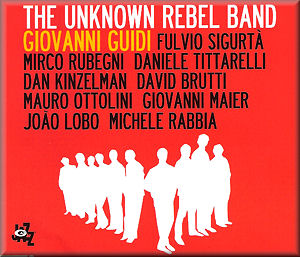1. Unknown Rebel with White Shirt
2. Prazske Jaro
3. Wounded Knee
4. Il Partigiano Johnny
5. Napoli 27-30 Settembre 1943
6. Paisa
7. Sono Sethu Ubumnyama
8. Guernica
9. The Uprising of 20,000
10. 180/78
11. Queimada
12. Garage Olimpo
13. Unknown Rebels
Giovanni Guidi - Piano
Fulvio Sigurtŕ, Mirco Rubegni - Trumpet, flugelhorn
Daniele Tittarelli - Alto sax, soprano sax
Dan Kinzelman -Tenor sax, clarinet, bass clarinet
David Brutti - Baritone sax, bass sax
Mauro "Otto" Ottolini - Trombone, bombardino
Giovanni Maier - Double bass
Joao Lobo - Drums
Michele Rabbia - Percussion
Italian pianist Giovanni Guidi is still in his twenties but he already
has a very mature musical mind. He has played in various groups led
by trumpeter Enrico Rava and is currently a member of Rava's quintet.
On his Facebook site, Giovanni cites his enthusiasm for the Beatles,
Tom Waits, Joni Mitchell, Sun Ra, Wayne Shorter and Woody Allen -
an eclectic mix.
Matching this eclecticism, Giovanni's new CD is an album of contrasts,
with arranged chorale-like passages interspersed with pensive piano
solos and noisy outbursts of free jazz, complete with the usual screeching
and screaming. It's the sort of album where you can expect the unexpected.
The album is dedicated to the rebels against injustice whose names
remain unknown - especially the young man in the white shirt who fearlessly
faced the tanks in China's Tiananmen Square 20 years ago. Guidi wrote
most of the pieces himself, although American reedman Dan Kinzelman
did the bulk of the arranging. The music reminds me very much of Carla
Bley - not only in its mixture of unexpected sounds but also because
of the rasping trombone of Mauro Ottolini, who has a similar outspoken
tone to Carla's Gary Valente. Mauro adds a powerful solo to Prazske
Jaro (Prague Spring).
Wounded Knee depicts the appalling slaughter of the Sioux
at the Battle of Wounded Knee in a mixture of free blowing
and doomy chords. Three of the pieces (tracks 4, 5 and 6) concern
the uprising against Fascism in Italy during the Second World War.
The first is a slow, thoughtful piano solo. The second is a very clangorous
number, with discordant brass and a military marching beat, although
it quietens down in the middle for a funereal chorale and an elegiac
trumpet solo, hotting up again towards the end with Ottolini's growling
trombone. Paisa, inspired by Roberto Rosselini's film, returns
us to comparative tranquillity.
Track 7 is an elegy for those who resisted apartheid in South Africa.
Guernica ominously captures the horrific bombing by
German aircraft of a Spanish Basque city immortalised in Picasso's
famous painting. The Uprising of 20,000 commemorates with a
bass solo a strike by thousands of New York shirtmakers in the early
20th century, although the composition is so short as to have little
impact.
180/78 recalls the closure of mental hospitals in Italy, although
the music has echoes of Weimar Germany, with an unsettling waltz and
weird sirens in the background. Quiemada was inspired by Pontecorvo's
movie which attacked European colonialism. The track includes a poignant
trumpet solo and some meditative piano. Garage Olimpo was prompted
by another film - about the victims who were tortured and "disappeared"
in Argentina. It is a violent, disturbing piece.
The album ends with Unknown Rebels, which sounds like free
improvisation, although it hangs together much better than many pieces
of free jazz. The overall mood of the CD might be described as "sombre"
but it is uplifting in its homage to unknown resisters and in its
musical variety and complexity.
Tony Augarde
